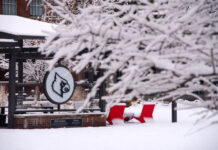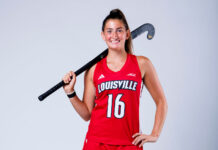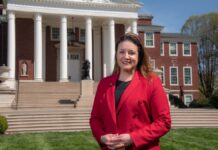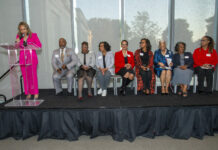One step, then another, then another.
Suspended in a pediatric therapy harness, the boy’s feet moved across the treadmill. Each foot strike represented new hope for kids living with neurological conditions – to regain motor function, improve trunk control and even take steps on their own.
That technology, invented by UofL researchers, is helping patients thanks to UofL’s unique suite of programs aimed at moving biomedical research from lab to market as products that can save and improve lives. Now, via a new partnership called the MidSouth Hub, UofL is offering its expertise to researchers across the four-state region of Kentucky, Virginia, Mississippi and Tennessee.
“Seeing how the technology we’d worked so hard to support could impact that boy’s life was one of the proudest moments of my career,” said Jessica Sharon, senior director of innovation programs and new ventures at UofL. “That’s when I knew we were building something special here at UofL. With the MidSouth Hub, we can expand that impact and ensure even more potentially life-changing technologies make it out of universities and help patients.”
PROOF OF CONCEPT
UofL’s focus on innovation begins with the belief that good ideas shouldn’t stay in the lab — they belong out in the world, where they can make a positive impact as new diagnostics, treatments and therapeutics. To that end, the university has spent the past decade aggressively growing its support for biomedical innovation, helping researchers develop, test and refine their ideas before launch.
UofL secured its first biomedical product innovation grant, the Wallace H. Coulter Translational Partnership, in 2011. Building on that success, UofL landed two more programs a few years later: Kentucky’s first NSF Innovation Corps (I-Corps) site and NIH Research Evaluation and Commercialization Hub (REACH), led by now retired professor, Paula Bates.

Those were quickly followed by another award, then another, then another, and today, UofL holds a robust suite of programs unique from its peers across the country. With each new round of funding UofL forged new partnerships that expanded the impact first across the Commonwealth, and now, to the four-state region. The result is the MidSouth Hub, a multi-institution partnership led by Vanderbilt University, with UofL providing its original programming and leading efforts in Kentucky.
“UofL has developed strategies that can help anyone to create healthcare solutions, whether you are a professor at a large university or a student at a technical college,” said Matt McMahon, Director of the NIH’s SEED (Small business Education and Entrepreneurial Development) Office, which supports REACH. UofL is the only university to succeed in all three rounds of REACH funding.
“And in the end,” he said, “it’s patients and communities that benefit. We’re very excited to see UofL offer their leadership and expertise in scaling their approach across a broader part of the country.”
That approach is key to developing technologies like the pediatric therapy harness, which provides partial body weight support as therapists help the kids move their feet over the treadmill. The idea is to slowly and safely turn on muscles and gain control. Designed by researchers Andrea Behrman and Tommy Roussel, that technology has since been licensed and units are in-place or on their way to facilities in Pennsylvania, Texas and New York, as well as Kentucky.
“I don’t know a university that supports faculty more for innovation and biomedical design than UofL,” said Behrman, a professor of neurological surgery and director of the Kosair for Kids Center for Pediatric NeuroRecovery. “It’s a massive help in moving good ideas down the path, and getting them out where they can actually help patients.”
THE RIGHT STUFF
When it comes to good ideas, UofL has plenty to choose from. A Carnegie Research-1 university with a robust academic medical center and affiliated health system, UofL’s clinicians and researchers work to discover, invent, test and implement cutting-edge medical innovations that ultimately are commercialized.
“This kind of direct impact just isn’t possible without those ingredients,” said Jon Klein, UofL’s interim executive vice president of research and innovation and vice dean for research at its School of Medicine. “That intersection of medicine, research and our suite of innovation programs — that mix is driving positive patient outcomes here and beyond.”

Those positive outcomes cover a range of potentially devastating diagnoses. Take the cancer-fighting technology invented by researchers Geoffrey Clark, Joe Burlison and John Trent, which works by targeting the RAS protein. When mutated, RAS turns into a stuck accelerator pedal, with cells suddenly growing very fast and penetrating other tissue, just like a tumor cell.
Stopping that process has long been considered a ‘holy grail’ that could shut down at least a third of human tumors. Thanks in part to support from UofL’s innovation programs, that technology is now in development with Qualigen Therapeutics, Inc., a publicly traded California-based biomedical company, and moving down the long pathway to FDA approval.
“UofL is in a unique position to develop technologies like this because you not only have actual clinicians and cutting-edge research, but programs to assist industry partners to drive the resulting innovations to market,” said Michael Poirier, the company’s Chairman and CEO. “We look forward to continuing work with UofL and to advancing these important clinical technologies with the goal of developing an effective treatment for this unmet need.”
READY TO LAUNCH
Over the past decade, UofL’s I-Corps and REACH programs have supported hundreds of innovators, dozens of new products and licensing agreements, millions in follow-on funding and the launch of at least 16 new companies.
One of those companies is led by School of Medicine researcher Matthew Neal, who participated in UofL’s Economic Development Administration-backed PRePARE program for developing pandemic-related technologies, along with the I-Corps site before going on to the prestigious national NSF program to develop his VR technology for patients with hearing deficiencies.

Neal’s technology aims to help patients program their hearing aids and test out different models in realistic virtual environments, such as a noisy restaurant, all without leaving the comfort of the clinical setting.
That led to a startup, Immersive Hearing Technologies, which Neal co-founded with former university entrepreneur-in-residence, Jeff Cummins. Together, they’ve already secured non-dilutive follow-on funding and are on their way to improving the clinical processes behind a widespread problem – hearing loss – affecting one in eight Americans over the age of 12.
“The innovation programs were invaluable in understanding who our customers are, what they needed and how we might get this technology to market,” Neal said. “It’s no good if an idea like this just sits on a shelf. This is a technology that can help people, and it needs to be out in the world to do that.”
And that’s the goal, Sharon said.
“We don’t want good ideas to stay on our campus or any campus,” Sharon said. “With these programs, we’re going to keep growing, keep pushing, to move these innovations from lab to market. And with this new MidSouth Hub, I know we can do that on an even bigger scale.”

























